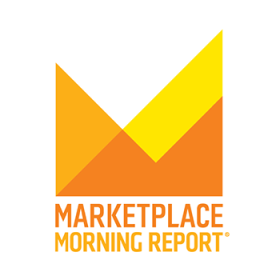
Marketplace Morning Report
Weekdays during Morning Edition (6:51am and 8:51am)
Marketplace Morning Report is the morning sister program from the award-winning staff of Marketplace. Bringing you the morning business news "for the rest of us" in the time it takes you to drink your first cup of joe, MMR is a great way to start your day.
-
MFS, a big lender based in London, has been making risky loans and is in the British equivalent of bankruptcy. Now, investors are buying up U.S. government bonds, and lenders are pulling back from the riskiest parts of the private credit markets. Is there a bigger pattern here? We'll discuss. Then, Anthropic is rejecting the Pentagon’s demands for unrestricted use of its technology, and we'll hear how business is going for a Main lobster fisherman.
-
Paramount Skydance appears to have won the bidding war for Warner Bros. Discovery. Paramount raised its offer, and rival Netflix refused to match it, saying the deal is “no longer financially attractive.” The merger still has to be approved by federal regulators. We'll learn more, then dig into the current state of streaming services. And later in the program, roughly half of high schoolers planning to go to college are using AI tools in their search.
-
From the BBC World Service: First up, British manufacturer Dyson settles a lawsuit filed against it by 24 migrant workers, and the Premier League says it's launching its own streaming service. And while David Brancaccio and the team will continue to share the economic news you need each weekday morning, today marks the final edition of the "Marketplace Morning Report" produced by the BBC World Service. Host Leanna Byrne reminisces about some of the show’s biggest global news stories from over the years.
-
Now that the Winter Olympics have wrapped up, the Milan Cortina Paralympic Games kick off on March 6. Dozens of athletes will represent Team USA in sled hockey, skiing, wheelchair curling, and snowboarding. But getting to the Olympics or Paralympics is expensive and costs competitors an average of $12,000 a year. For winter athletes in particular, the costs can be even higher. But first: why the FDA is looking to put the brakes on compounded GLP-1s.
-
The AI company Anthropic is loosening some of its core safety principles. Anthropic unveiled a new policy on safeguards earlier this week, moving from self-imposed guardrails to non-binding goals for AI safety. At the same time, the company is facing pressure from the Pentagon to roll back limitations on how Anthropic’s Claude AI models are used. We hear more. Also: a conversation about age-verification rules on social media and privacy concerns.
-
From the BBC World Service: The United States says it will allow some small Venezuelan oil shipments to reach Cuba, providing a lifeline to the Caribbean island. Cuba's electricity grid runs on foreign oil, and without it, the lights simply don't stay on. Then, we'll head to one small town in the north of England, where a collection of 13 charity thrift shops on its Main Street is attracting visitors from far and wide.
-
First up, AI has driven a market moodiness as of late. Broader anxieties have sparked sell-offs, while bullish tech optimism has also boosted stock indexes. What gives? Then, companies are expected to spend a whopping $50 billion a month on AI data center construction over the next few years. Those firms are issuing investment-grade corporate bonds to pay for it all. This morning, we'll dig into what that could mean for interest rates.
-
Last night, President Donald Trump strongly defended his tariffs in his State of the Union address. He made the case for future tariffs, despite the Supreme Court decision last week striking down the centerpiece of his tariff policy. Trump also expressed hope that import taxes will someday replace income taxes. Plus, Nvidia is looking to get back into the consumer market, and mortgage rates dipped below 6% this week.
-
From the BBC World Service: German Chancellor Friedrich Merz says there is a great opportunity to develop ties with China following a meeting with its leader, Xi Jinping. Before the trip, Merz said there needs to be a fair competition and jointly agreed-upon rules between the two countries. Also, starting today, almost all visitors to the United Kingdom will need to apply for an electronic travel authorization that costs around $21 before entering the country.
-
A new working paper from the National Bureau of Economic Research spotlights how immigrants may be shaping the health and mortality rates of older Americans. Researchers found that a roughly 25% increase in immigration to the United States could prevent nearly 5,000 deaths among seniors 65 and over. Today, we'll unpack the findings. But first, an ominous tale of AI destruction captured the imagination of the public — and stock market traders.
